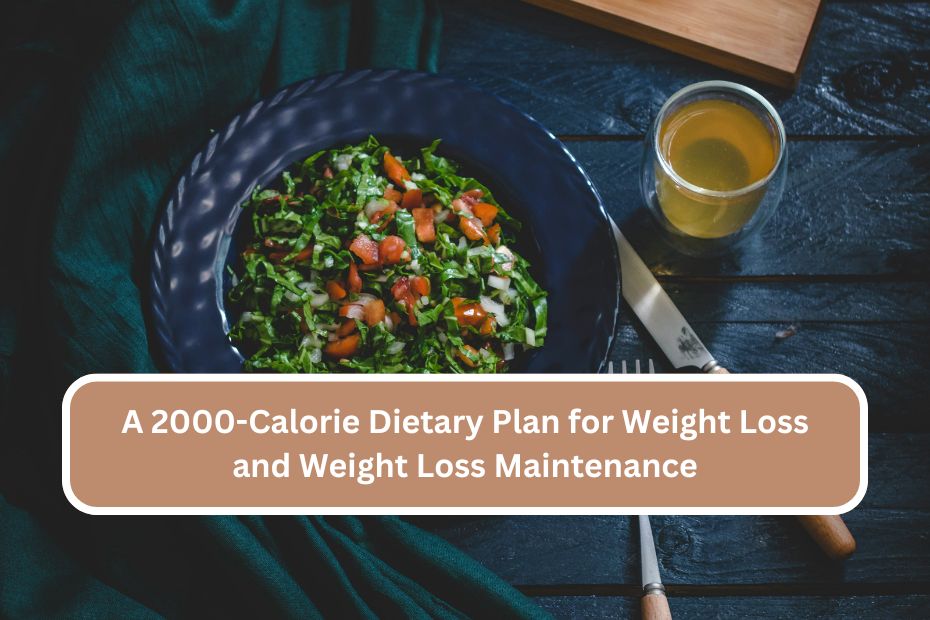Maintaining or losing weight doesn’t have to be overly complicated. A 2000-calorie dietary plan offers a balanced approach to help you achieve your health goals while still enjoying a variety of delicious meals. Here’s a guide to creating a sustainable and effective 2000-calorie diet plan.
Why Choose a 2000-Calorie Plan?
A 2000-calorie diet is often considered the standard daily intake for most adults. For individuals with higher caloric needs, this plan can help with weight loss. For those with lower caloric needs, it can aid in weight maintenance when paired with regular exercise.
The Basics of a 2000-Calorie Diet
Key Nutritional Goals
- Carbohydrates: 45-65% of daily calories (~225-325 grams)
- Proteins: 10-35% of daily calories (~50-175 grams)
- Fats: 20-35% of daily calories (~44-78 grams)
- Fiber: 25-30 grams per day
Sample 2000-Calorie Daily Meal Plan
Breakfast (400 Calories)
- 2 scrambled eggs cooked with 1 tsp olive oil (140 calories)
- 1 slice whole-grain toast (80 calories)
- ½ avocado (120 calories)
- 1 medium orange (60 calories)
Morning Snack (200 Calories)
- 1 cup Greek yogurt, non-fat (100 calories)
- 1 tbsp honey (60 calories)
- 5 almonds (40 calories)
Lunch (600 Calories)
- Grilled chicken breast (4 oz) (165 calories)
- 1 cup quinoa (222 calories)
- 1 cup steamed broccoli (55 calories)
- 1 tbsp olive oil for dressing (120 calories)
- 1 small apple (38 calories)
Afternoon Snack (150 Calories)
- 1 medium banana (105 calories)
- 1 tbsp peanut butter (45 calories)
Dinner (550 Calories)
- 5 oz baked salmon (250 calories)
- 1 cup roasted sweet potatoes (100 calories)
- 1 cup mixed greens with balsamic vinaigrette (80 calories)
- 1 tsp olive oil for roasting (40 calories)
- 1 small whole-grain roll (80 calories)
Evening Snack (100 Calories)
- 1 square dark chocolate (70% cocoa) (60 calories)
- 1 cup chamomile tea with 1 tsp honey (40 calories)
Tips for Weight Loss with a 2000-Calorie Plan
1. Focus on Whole Foods
Choose minimally processed foods like fruits, vegetables, lean proteins, whole grains, and healthy fats.
2. Stay Hydrated
Drink plenty of water throughout the day to stay hydrated and control hunger.
3. Meal Prep
Prepare meals ahead of time to avoid unhealthy snacking and maintain portion control.
4. Track Calories
Use apps or journals to track your daily calorie intake and stay within the 2000-calorie limit.
5. Incorporate Exercise
Combine this diet with regular physical activity to enhance weight loss or maintain your current weight.
Adjusting the Plan for Individual Needs
For More Weight Loss
- Reduce your daily intake to 1500-1800 calories if medically approved.
- Increase physical activity levels.
For Maintenance
- Stick to 2000 calories, but adjust based on your activity level and metabolism.
For Vegetarians or Vegans
Substitute animal proteins with plant-based options like tofu, lentils, beans, or tempeh.
Benefits of a 2000-Calorie Plan
- Sustainable: Provides enough food to keep you satisfied while promoting gradual weight loss.
- Nutrient-Dense: Encourages healthy eating habits by focusing on balanced meals.
- Flexible: Allows for adjustments based on dietary restrictions and preferences.
Common Mistakes to Avoid
- Skipping Meals: Leads to overeating later in the day.
- Choosing Empty Calories: Avoid sugary drinks and snacks that don’t provide nutrients.
- Ignoring Portion Sizes: Even healthy foods can lead to weight gain if overeaten.
Conclusion
A 2000-calorie dietary plan is a versatile and sustainable approach for weight loss and maintenance. By focusing on nutrient-dense foods, portion control, and regular exercise, you can achieve your health goals without feeling deprived. Remember, consistency and mindful eating are key to long-term success.

